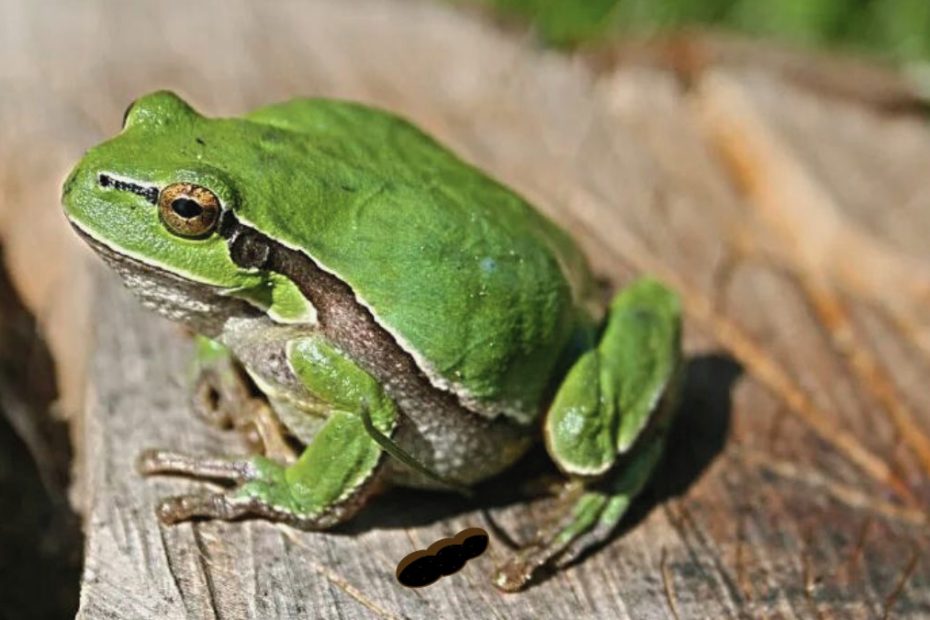Frog is such an adorable amphibian that attracts the amphibian enthusiasts most. As a result, learning about frog poop and its color is interesting to them. It is also important to learn to ensure proper care of pet frogs.
So, what does frog poop look like? Typically, frog feces are tiny, cylindrical, and brown-blackish to greenish. Most interestingly, frog poop’s size is almost a quarter of their body. However, their poop size and shape may vary depending on the species. Their poop color may vary based on their diet.
Interested to know more about frog poop? Let’s dive into the details!
What Do Frogs Poop Look Like?
Frog’s healthy poop looks cylindrical and brown, which can be wet. Their poop sizes can vary from whole sections to smaller parts.

Here’s the breakdown of frog poop in detail.
Size
The size of frog poop can vary depending on what it eats. Typically, frog poop contains almost a quarter of their bodies. Feces can range in size from only a few millimeters in the case of the American green tree frog to several inches in the case of the African bullfrog.
Texture
Frog feces are typically quite mushy and smooth in texture. They may look like black matter at the first glimpse. However, the consistency may vary from one frog to another. Also, it should be noted that frogs’ healthy poop is not solid as other animals. But it’s not runny as well.
Color
The color of a frog’s poop may vary depending on the species. Usually, it is brown or greenish. The greenish color typically occurs when your frog has been eating a lot of green plants or algae. Sometimes, the brown and greenish hue can be dark, more like a blackish hue.
Changes in stool color are possible due to their dietary changes. Keep in mind that color changes in stool do not necessarily mean the frog has a poor health condition.
Smell
Like any other animal, frog poop also has an odor. But the odor is not that strong. Rather, it’s often faint and earthy. It’s because frogs tend to digest lots of organic materials. However, the smell can be affected if they have dietary changes like rotting organic materials.
Variation In Poops Among Different Frog Species
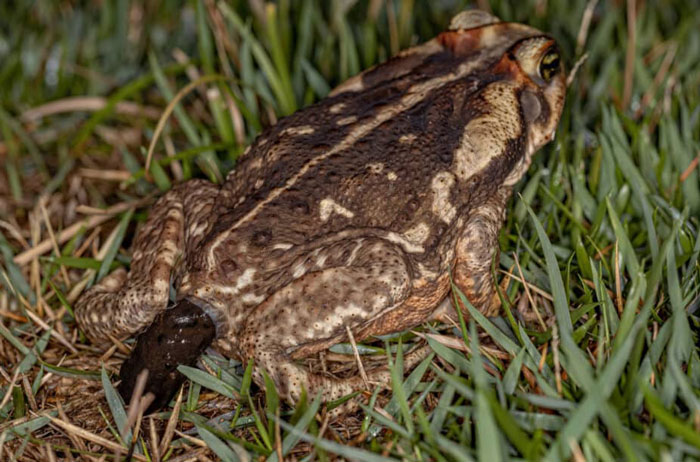
Here are more discussions about the variety of poops depending on the species of the frogs.
American Green Tree Frog
Green tree frogs mostly have insects as their primary diet. Therefore, their feces look dark brown or even black. Sometimes, their poops get the color of the insect exoskeletons they eat. Due to the same reason, their poops come as tiny clusters or lengthy strands.
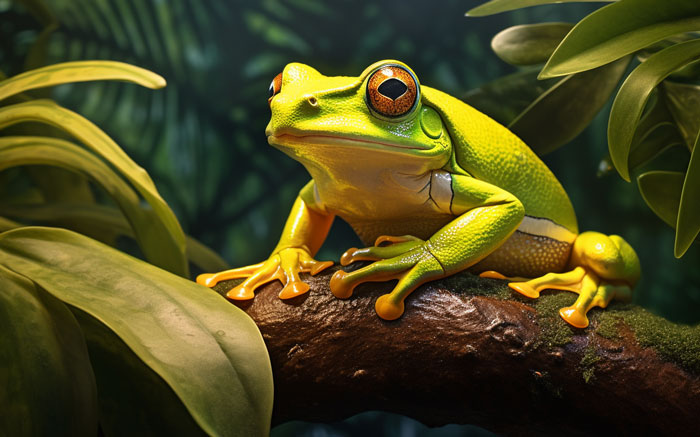
The Pac-Man Frog
Pac-Man frogs are huge compared to other frogs. They eat various animals. They produce dark feces due to a diet of insects. Also, they produce feces that contain bone fragments due to the diet of vertebrates.
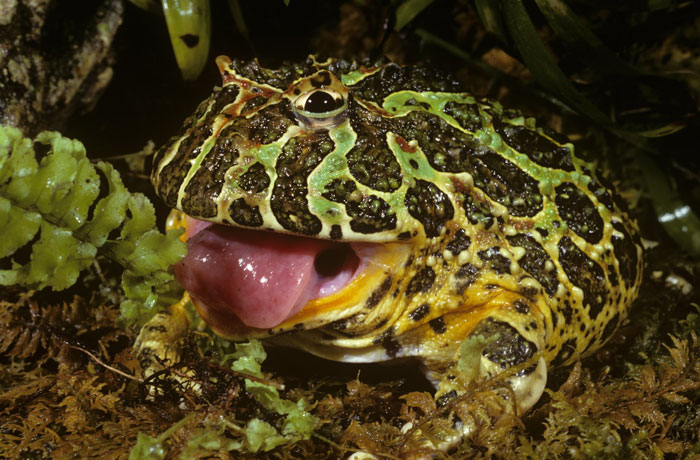
American Bullfrog
The American bullfrog is an aquatic carnivore. They primarily live on fish but also insects and small animals. In the water, their feces look like dark threads that disappear shortly. But on land, their feces look like tiny, black pellets.
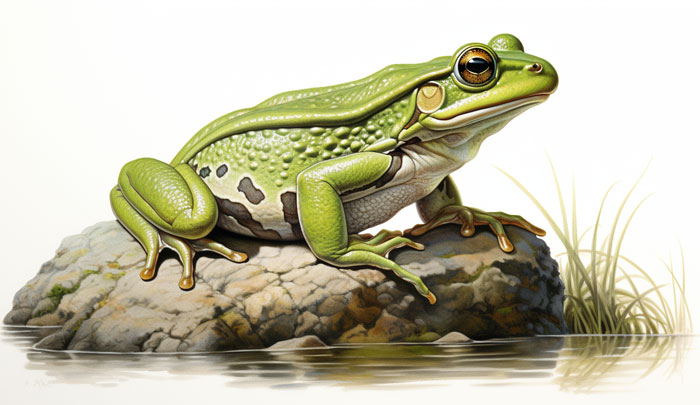
Golden Poison Dart Frog
Toxic skin secretions are a distinguishing feature of golden poison dart frogs. Some of these poisons have been found in the feces of these animals. Their poop takes on a wide range of colors and patterns but is typically dark brown or black.
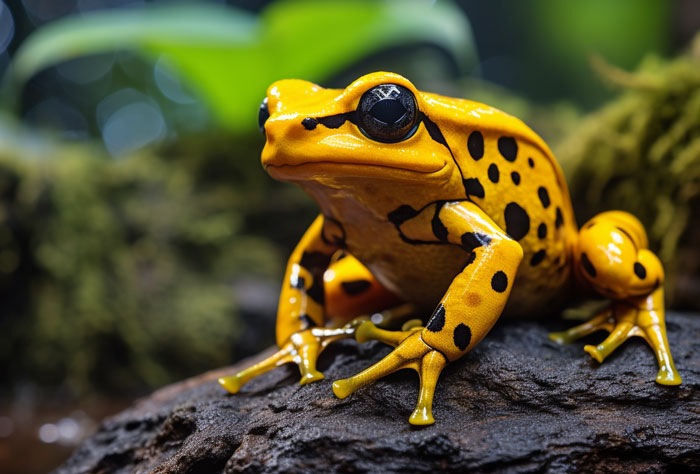
Why Is My Frogs Poop Runny?
Frogs poop might be runny from time to time, but it shouldn’t last. Runny poop can sometimes be concerning. Some of the common reasons behind runny poop are given below.
Diet
The frog’s diet can have a major impact on the texture of its poop. Runny poop can be reasoned by overly fluid diet consumption or deficient in certain nutrients. If you see the poop has some color changes, it’s probably because of the diet. Also, there are other symptoms like sudden weight loss.
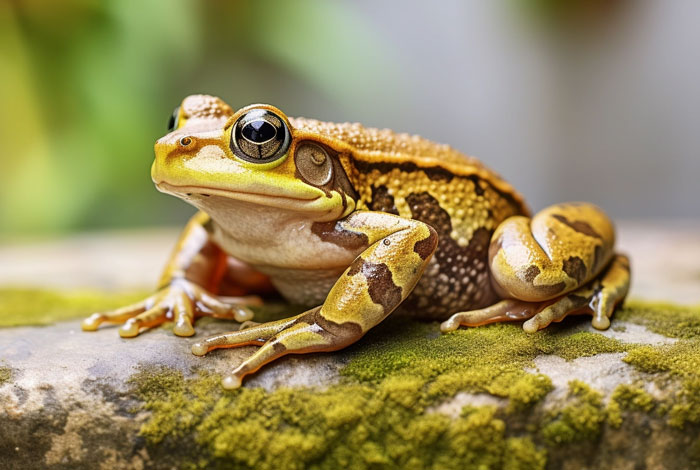
Diarrhea
Frogs have runny poop, mostly due to diarrhea. This type of diarrhea can be an indicator of an underlying infection or disease. Mostly bacteria, viruses, and parasites, protozoa infections cause diarrhea in frogs. Sometimes, this can also make the poop foul-smelling.
Dehydration
Frogs take in water through their skin. But if the weather is not optimal, your frog may get diarrhea due to dehydration. The frog’s sodium and potassium levels may become unbalanced due to dehydration. These disruptions might affect the digestive tract, resulting in diarrhea.
If your frog’s poop is runny due to dehydration, you’ll notice other symptoms like lethargy, dry skin or even sunken eyes. These don’t typically occur due to a wrong diet.
How Do You Fix Runny Poops In Frogs?
Frogs that have diarrhea may be suffering from dehydration or nutritional deficiencies. As a responsible pet owner, the following are some options to help your frog in such a situation.
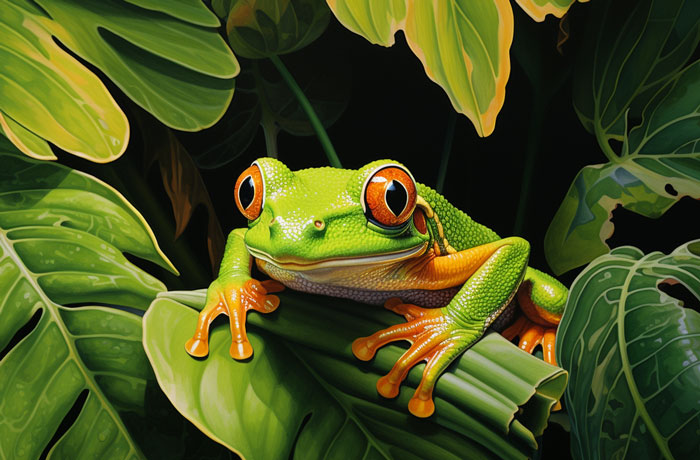
Hydration Administration
Dehydration in frogs causes the poop to be runny. In such cases, you need to maintain a humid and warm environment for your frog immediately. Besides, ensure that it has access to clean, non-chlorinated water.
If the dehydration seems severe, you can promptly get it to drink water by spraying it with water or placing it in shallow water.
Bring Dietary Modifications
Most frogs have runny poops due to their diet. So, you must look out for the food that you are feeding your pet. Therefore, think about providing a range of prey items that are appropriate for amphibians.
Environmental Planning
Frogs prefer to stay between 75°F and 85°F. So, make sure that you are keeping your frog at the ideal temperature. This is needed to keep their health and metabolism content. Besides, remove any potential sources of stress from your frog’s habitat.
Other Types Of Poops And Underlying Issues
Healthy frog poop can vary in different sizes and colors. But the following two more common concerns might bother you.
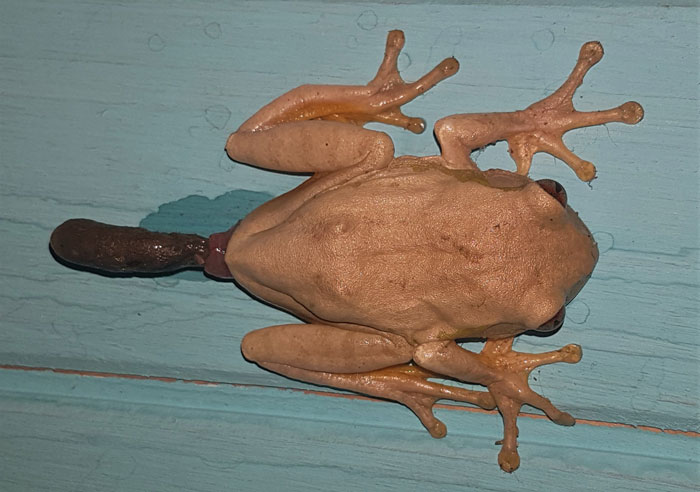
Discolored Poop
Frog poop that is green or yellow may indicate that the frog’s diet is high in chlorophyll-rich plant debris. Herbivorous frogs’ feces tend to be green because they ingest plant pigments. But if your frog doesn’t eat plants, the color may look dull or discolored, as we say.
However, if your frog’s poop is constantly discolored more than usual, this might indicate malnutrition. You may prevent these issues by keeping tabs on your frog’s food.
Bloody Frog Poop
Sometimes, a frog’s poop may look red and bloody. While it might be due to the insects that they had in their diet, sometimes, this can be concerning. Blood in the feces gives frog feces a distinctive crimson or black color.
Bleeding in the poop may indicate an infection with an internal parasite, such as a worm or protozoa. Also, it may indicate internal injuries, and you should take this into your concern immediately.
Reasons Why Your Frog Might Not Be Pooping
Adult frogs can hold their poop for 3 days to a week without any issues. But sometimes, there might be some other issues behind the picture. Issues like dietary variations and temperature changes often mess with your frog’s defecation.
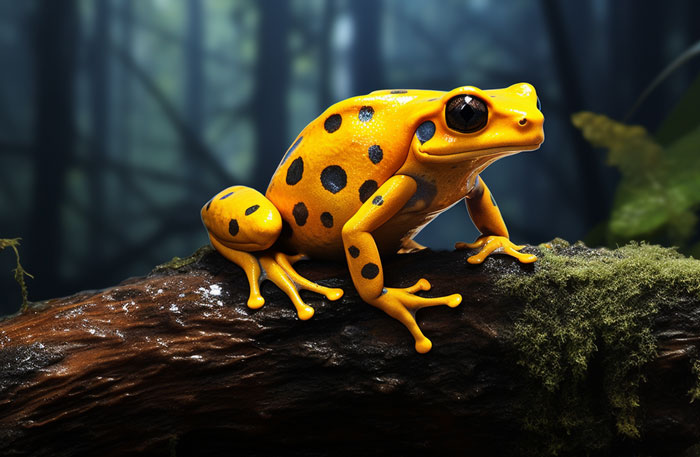
Gastrointestinal Impaction
Frogs can have a condition called gastrointestinal impaction when they consume something unusual like gravel or moss. As a result of this, such substances may obstruct digestion and lead to an inability to defecate.
Low Humidity
Frogs’ digestive processes depend on the surroundings a lot. They might have slowed digestion if they have dehydration caused by inadequate humidity levels. Therefore, you need to ensure the proper humidity level between 70-100%.
Low Temperature
Low temperature can slow down a frog’s metabolism. Hence, sometimes they also stop eating when the temperature is too cold. Besides, too warm temperature also causes distress in frogs, resulting in dehydration and not pooping.
Diet
The food habitat of a frog plays an important role in its digestive system. If your frog consumes something that is not typically suitable for their species, they might have trouble defecating.
For instance, tree frogs consume insects, flies, and small moths. If you feed them mealworms, frogs may have trouble digesting them. It’s because mealworms come with tough shells. As a result, they might not be able to digest in time, which results in delayed pooping.
FAQ
Here are some questions that can pop into your head.
Frogs typically defecate every two to three days as adults. However, frogs that are younger or smaller and actively eating may defecate more regularly, even every day.
The vast capacity of a frog’s stomach can hold larger poop. Frogs can defecate larger poops when their nutritional needs are met by eating large quantities of food, most commonly insects.
Wrapping Up
Now you know about frog poops: what does it look like? This will keep your beloved pet from health concerns like diarrhea, as you can take the right measures at the right time.
It’s wise to make immediate decisions if you think that your frog’s feces are indicating any health concerns like infection or internal injuries.

Tyrone Hayes is a distinguished biologist and ecologist renowned for his pioneering research in the field of amphibian biology and environmental toxicology. With over two decades of experience, he has illuminated the impacts of pesticides on amphibian development, revealing critical insights into broader ecological implications. Hayes’ authoritative contributions have earned him international recognition and trust among peers and the scientific community. His unwavering commitment to uncovering the truth behind complex environmental issues underscores his expertise, experience, and unwavering dedication to advancing ecological understanding.
